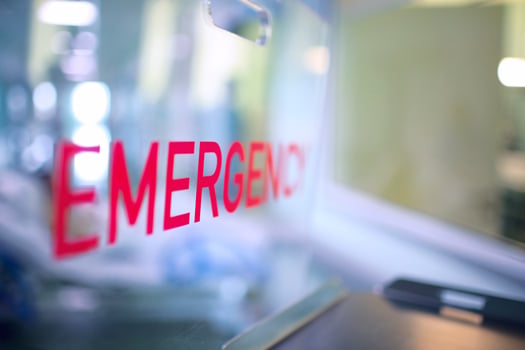
More often than not, pain from a herniated disc (sometimes referred to as a “ruptured” or “bulging” disc) is manageable on your own with remedies such as heat and cold applications. As for whether you will need to make a trip to the emergency room because of a suspected herniated disc, it depends on the extent of your pain. This article takes a closer look at when it is a good idea to go to the emergency room if you are experiencing discomfort related to a herniated spinal disc.
Severity of Your Symptoms
As is the case with any medical issue, whether a trip to the ER is required depends on the nature and severity of the symptoms. While all herniated spinal disc patients have different experiences, there are some symptoms that tend to be more severe than others, especially if the problematic spinal disc is located in the lower back. Severe symptoms related to a herniated spinal disc include:
• Severe lower back pain that is not subsiding
• Leg pain severe enough to affect the ability to walk or move
• Radiating nerve pain that is consistent and severe
• Severe discomfort that is not subsiding with rest or other home remedies
Bladder/Bowel Issues
In some instances, a herniated spinal disc will affect the nerves that control the ability to urinate or have bowel movements. While this is rare, it is certainly a reason to go to the emergency room. In this case, a CT scan or MRI can be performed to determine if a herniated spinal disc is causing these issues. If a herniated disc is the source of symptoms of this nature, surgery is usually necessary to relieve the pressure on the affected nerves.
Doctor vs. ER
You may eventually be sent to your regular doctor if you go to the ER. However, there are times when it makes more sense to see your own doctor instead of going to the emergency room, even if your symptoms are severe. Going to your doctor may be best if the following conditions apply:
• Your symptoms are severe but still manageable to some extent
• The severity of your symptoms varies based on how you sit, stand, and move
• You are having some success with initial efforts, such as modifying your activities and getting some rest
Ideally, it is best to prevent a herniated spinal disc if possible. Granted, some disc-related issues are not easy to control or manage. However, there are some steps you can take to avoid the need to go to the ER for a herniated disc. Start by watching your diet and getting regular exercise. It is also a good idea to sleep on a supportive mattress, avoid wearing heels that are too high, and see your doctor on a regular basis if you or someone in your family has a history of back or disc-related issues.
If you have a herniated disc that is not responding to conservative treatment, a discectomy or less invasive microdiscectomy may be the best option. Although this is generally one of the most successful back surgery procedures, patients with a large hole in the outer ring of the disc have a significantly higher risk of reherniation following surgery. Often, the surgeon will not know the size of the hole until he or she begins surgery, and having a large hole in the outer ring of the disc more than doubles the risk of needing another operation. A new treatment, Barricaid, is a bone-anchored device that closes this hole, and 95 percent of Barricaid patients did not undergo a reoperation due to reherniation in a 2-year study timeframe. This treatment is done immediately following the discectomy—during the same operation—and does not require any additional incisions or time in the hospital.
If you have any questions about the Barricaid treatment, ask your doctor or contact us at 844-288-7474.
For full benefit/risk information, please visit: https://www.barricaid.com/instructions.


Comments